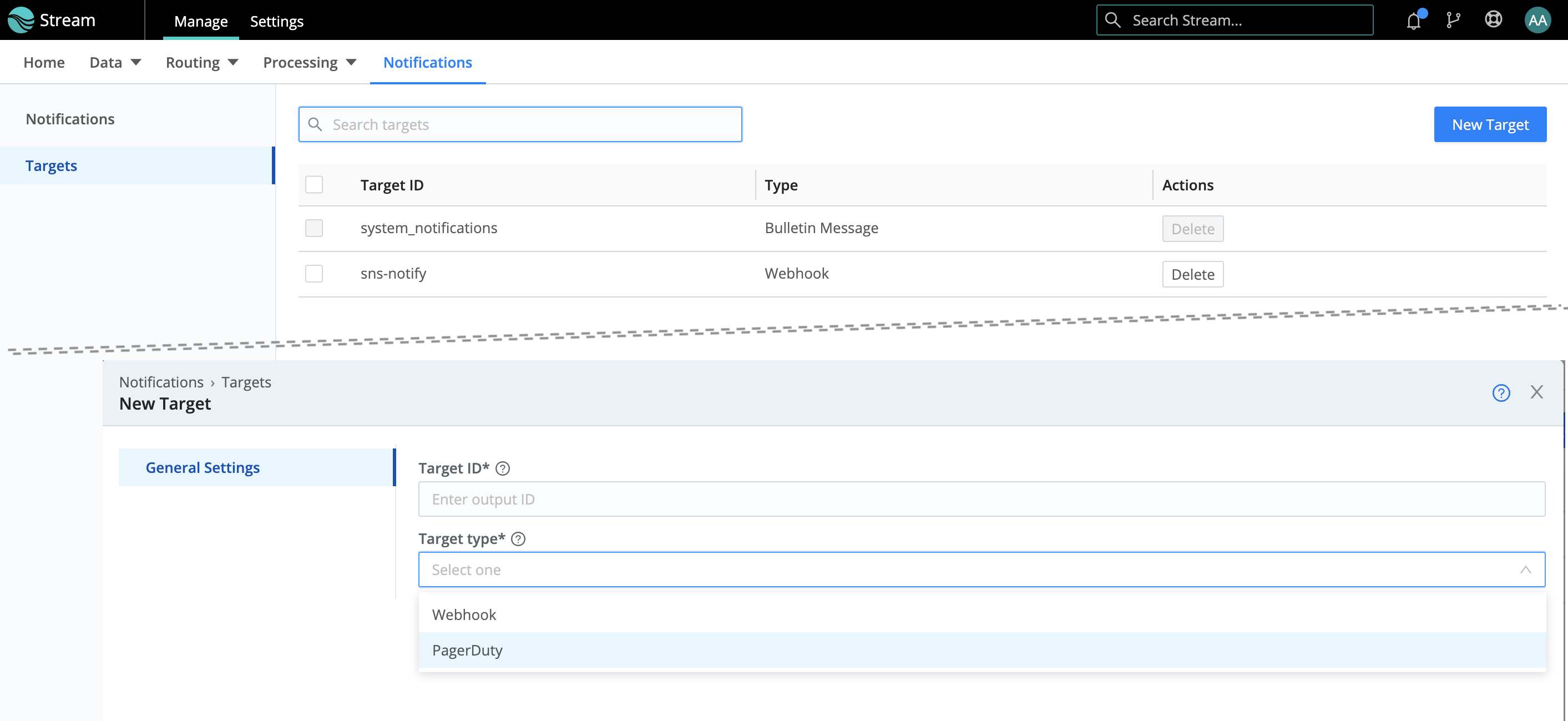These docs are for Cribl Stream 4.1 and are no longer actively maintained.
See the latest version (4.16).
Configuring Targets
To add a new Notification target from the Manage Notifications page’s Targets tab:
- Click Add Target to open the New Target modal shown below.
- Give this target a unique Target ID.
- Set the Target type to either PagerDuty or Webhook. Then configure the target according to the corresponding section below.

Notifications require an Enterprise or Standard license, without which all the target configuration options described on this page will be hidden or disabled in Cribl Stream’s UI.
PagerDuty Targets
This option sends Cribl Stream Notifications to PagerDuty, a real-time incident response platform, using Cribl Stream’s native integration with the PagerDuty API. Select Target type: PagerDuty to expose the following additional options on the modal’s (single) General Settings left tab:
Routing key: Enter your 32-character Integration key on a PagerDuty service or global ruleset.
Group: Optionally, specify a PagerDuty default group to assign to Cribl Stream Notifications.
Class: Optionally, specify a PagerDuty default class to assign to Cribl Stream Notifications.
Component: Optionally, a PagerDuty default component value to assign to Cribl Stream Notification. (This field is prefilled with logstream.)
Severity: Set the default message severity for events sent to PagerDuty. Defaults to info; you can instead select error, warning, or critical. (Will be overridden by the __severity value, if set.)
Webhook Targets
With this option, you can send Cribl Stream Notifications to an arbitrary webhook. Select Target type: Webhook to expose multiple left tabs, with the following configuration options:
General Settings
The added options that appear on this first left tab are:
URL: The endpoint that should receive Cribl Stream Notification events.
To proxy outbound HTTP/S requests, see System Proxy Configuration.
Method: Select the appropriate HTTP verb for requests: POST (the default), PUT, or PATCH.
Format: Specifies how to format Notification events before sending them to the endpoint. Select one of the following:
NDJSON(newline-delimited JSON, the default).JSON Array.Custom, which exposes these additional fields:- Source expression: JavaScript expression whose evaluation shapes the event that Cribl Stream sends to the endpoint. E.g.:
notification=${_raw}. For other fields you can use, see Expression Fields. If empty, Cribl Stream will send the full Notification event as stringified JSON. - Drop when null: Toggle to
Yesif you want to drop events where the above Source expression evaluates tonull. - Content type: Defaults to
application/x-ndjson. You can substitute a different content type for requests sent to the endpoint. This entry will be overridden by any content types set in this modal’s Advanced Settings tab > Extra HTTP Headers section.
- Source expression: JavaScript expression whose evaluation shapes the event that Cribl Stream sends to the endpoint. E.g.:
Authentication
Select one of the following options for authentication:
- None: Don’t use authentication.
- Auth token: Use HTTP token authentication. In the resulting Token field, enter the bearer token that must be included in the HTTP authorization header.
- Basic: In the resulting Username and Password fields, enter HTTP Basic authentication credentials.
Processing Settings
The options on this left tab are identical to those on the Webhook Destination’s Processing Settings tab, with two exceptions:
- The default System fields entry here is
cribl_host. - You cannot specify a post-processing Pipeline here.
Advanced Settings
The options on this left tab are identical to those on the Webhook Destination’s Advanced Settings tab.
Expression Fields
When building the Source expression, you can use the following fields:
Fields Common to All Notification Types
starttime: Beginning of the time bucket where this condition was reported. All Notifications have this.endtime: End of the time bucket where this condition was reported. All Notifications have this._time: Timestamp when this Notification was created. All Notifications have this.cribl_host: Hostname of the (physical or virtual) machine on which this Notification was created. All Destination and Source Notifications have this.cribl_notification: Configured name/ID of this Notification. All Destination and Source Notifications have this.origin_metadata: Object containing metadata about the Notification’s origin, with the following fields for all Destination Notifications:type: “output”.id: ID of the affected Destination.subType: Destination’s type (where applicable).
origin_metadata: Object containing metadata about the Notification’s origin, with the following fields for all Source Notifications:type: “input”.id: ID of the affected Source.subType: Source’s type (where applicable).
Unhealthy Destination
health: Numeric value where0=green,1=yellow,2=red.output: Output ID of the affected Destination._raw: “Destination${output}[in group${__worker_group}] is unhealthy”._metric: “health.outputs”.
Destination Backpresssure Activated
backpressure_type:1for Block,2for Drop.output: Output ID of the affected Destination._raw: “Backpressure ([dropping|blocking]) is engaged for destination${output}[in group${__worker_group}]”._metric: “backpressure.outputs”.
Source High Data Volume
health: Numeric value where0=green,1=yellow,2=red.bytes: Number of bytes received in the time bucket.input: Input ID of the affected Source._raw: “Source${input}[in group${__worker_group}] traffic volume greater than${dataVolume}in${timeWindow}”._metric: “total.in_bytes”.
Source Low Data Volume
health: Numeric value where0=green,1=yellow,2=red.bytes: Number of bytes received in the time bucket.input: Input ID of the affected Source._raw: “Source${input}[in group${__worker_group}] traffic volume less than${dataVolume}in${timeWindow}”._metric: “total.in_bytes”.
Source No Data Received
health: Numeric value where0=green,1=yellow,2=red._time: Timestamp when this Notification was created.input: Input ID of the affected Source._raw: “Source ${input} [in group ${__worker_group}] had no data for ${timeWindow}”._metric: “total.in_bytes”
License Expiration
severity: One of “warn” or “fatal”.title: One of: “License expiring soon, data will stop flowing.” Or: “License has expired. Data flow has been stopped.”.text: One of: “License will expire on${expirationDate}, no external inputs will be read after that time. Please contact sales@cribl.io to renew your license.” Or: “License has expired.”





